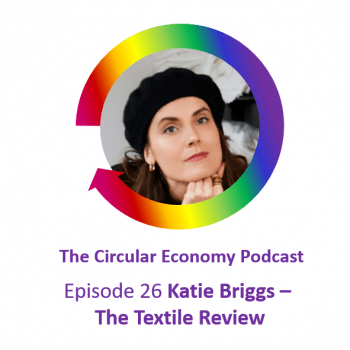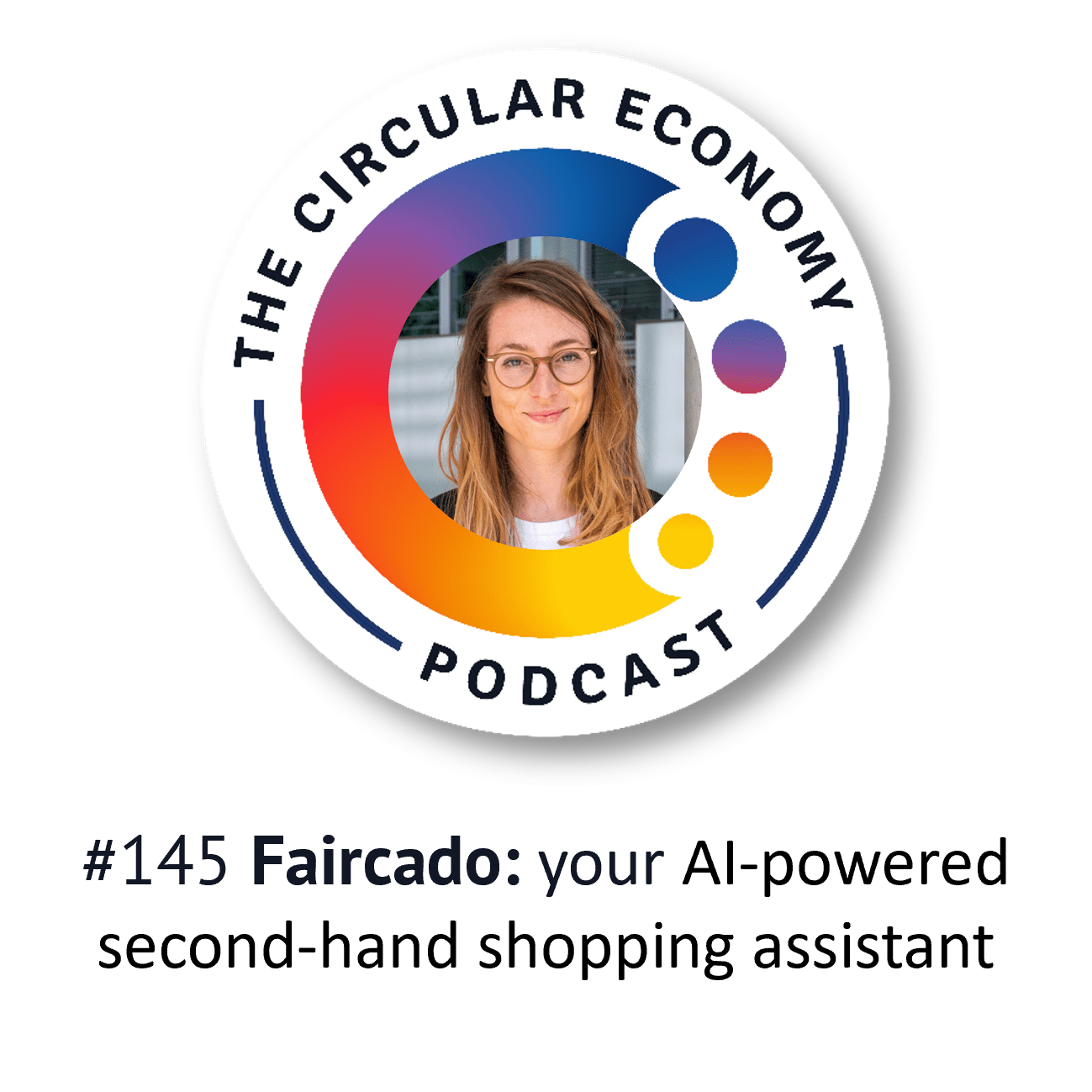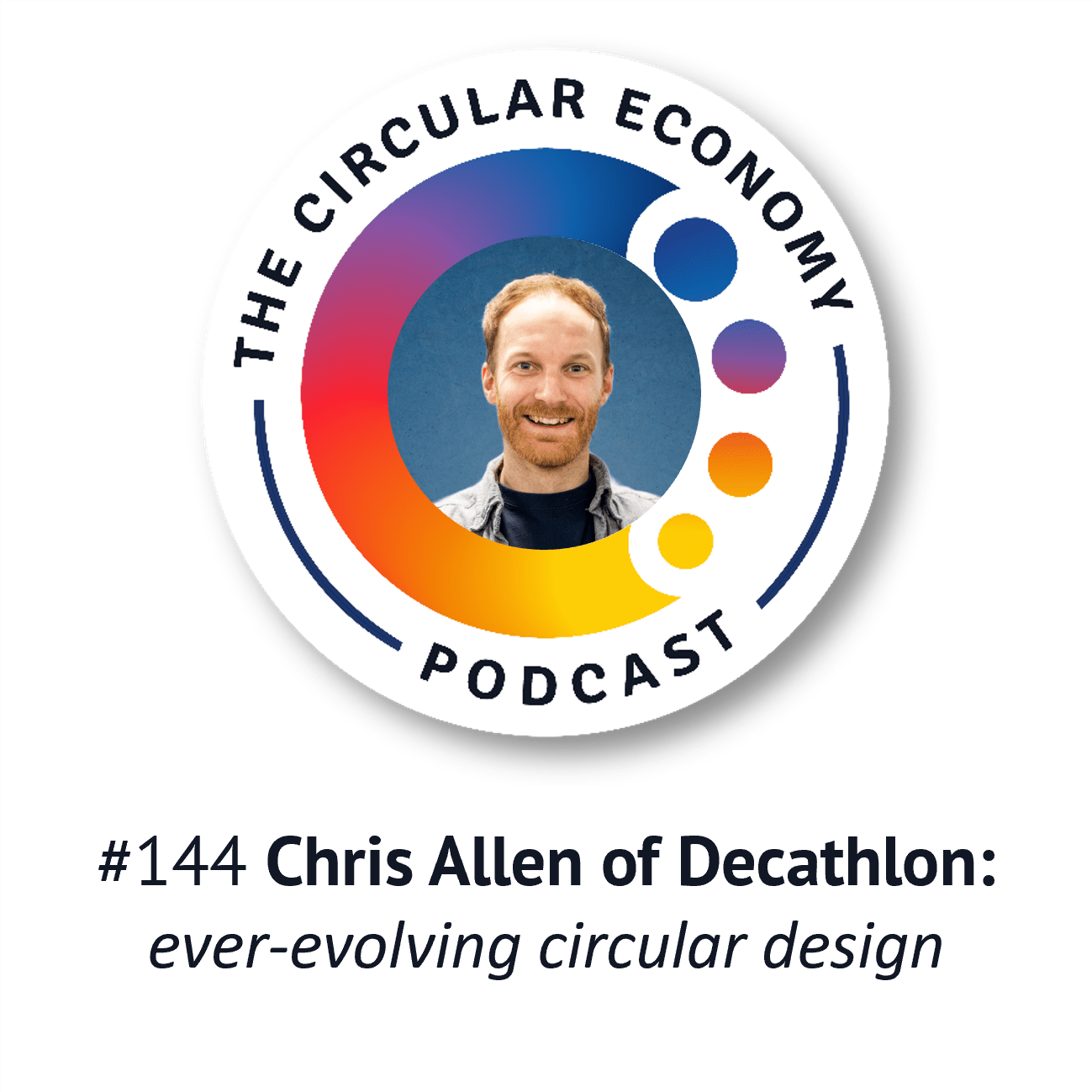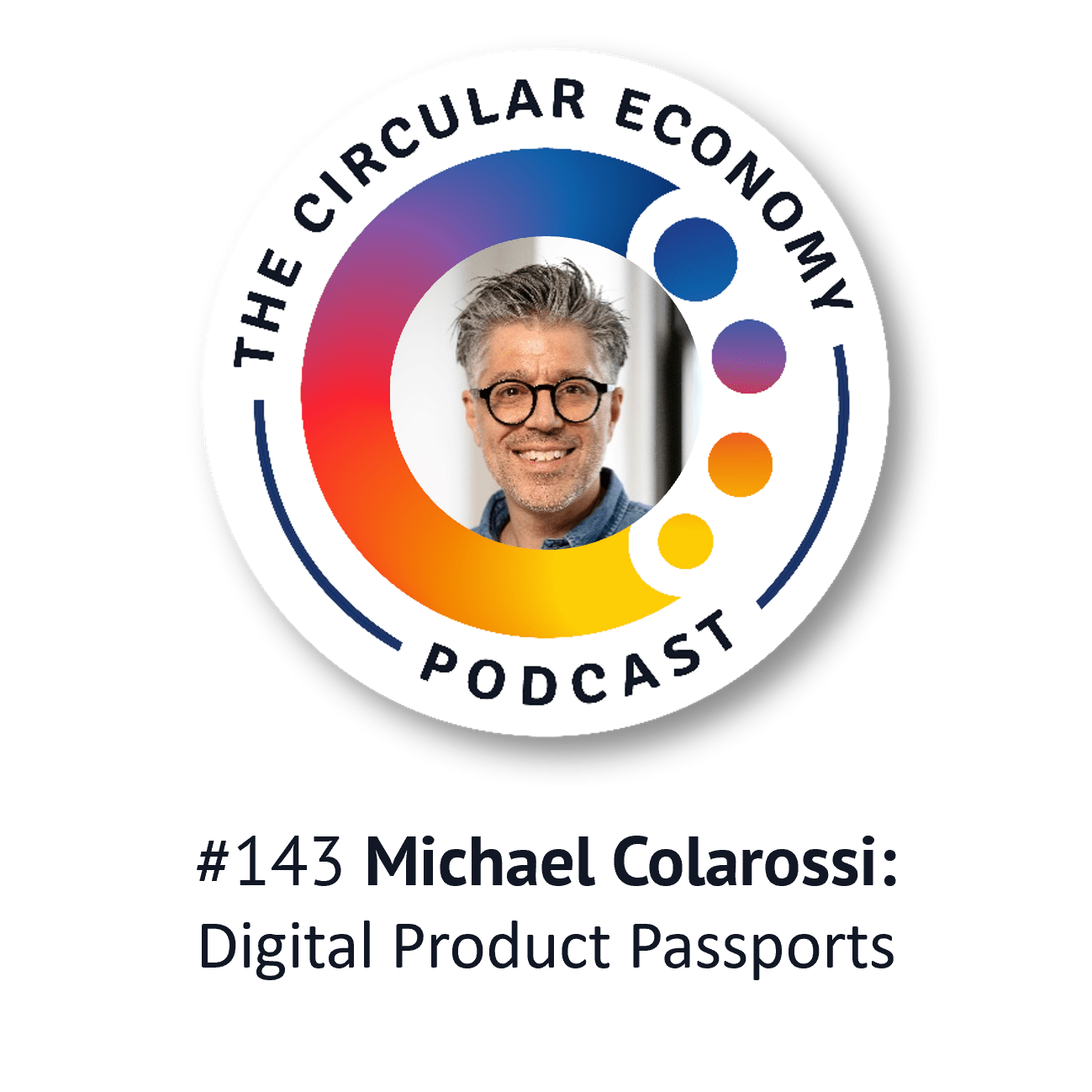Podcast: Play in new window | Download
 My guest today, Katie Briggs, set up The Textile Review to close the loop on textiles from the events sector.
My guest today, Katie Briggs, set up The Textile Review to close the loop on textiles from the events sector.
She has found customers who value that pre-used fabric, and she helps both the buyer and the seller reduce their costs and impact.
We recorded this towards the end of March 2020, about one week into the UK lockdown, and I’m hoping that Katie has found ways to pivot her business, maybe getting involved in making face masks or surgical scrubs.
Podcast host Catherine Weetman is a circular economy business advisor, workshop facilitator, speaker and writer. Her award-winning book, includes lots of practical examples and tips on getting started. Catherine founded Rethink Global in 2013, to help businesses use circular, sustainable approaches to build a better business (and a better world).
Stay in touch for free insights and updates…
Read on for a summary of the podcast and links to the people, organisations and other resources we mention.
You can subscribe to the podcast series on iTunes, Google Podcasts, PlayerFM, Spotify, TuneIn, or search for “circular economy” in your favourite podcast app. Stay in touch to get free insights and updates, direct to your inbox…
Links we mention in the episode:
- Katie Briggs on LinkedIn https://www.linkedin.com/in/katie-briggs-83aaa77a/
- The Textile Review https://www.thetextilereview.com/
- The Textile Review on Instagram @textile.review
- Community Wood Reycling https://www.communitywoodrecycling.org.uk/

About Katie
Katie is the founder of The Textile Review. While working previously in the events industry, she witnessed the vast material waste and felt compelled to create solutions to slow down the impact this has on the environment. In live events, fabric is heavily used as draping and other decor, often just for a few days before being thrown away. The opportunity for re-use is a big challenge and for Katie and The Textile Review, a direct and hands-on approach has been the way to begin addressing it.
The Textile Review reduces textile waste by reclaiming it from events and then makes it available again to hire or buy, where new isn’t necessary. The focus is on responsibility and shifting perspectives on the value of what already exists.
Transcript
*PLEASE ADD APPROX 40 SECONDS TO THE TRANSCRIPT TIMESTAMPS TO FIND THE RELEVANT POINT IN THE PODCAST.
Catherine Weetman
In today’s episode, I’m talking to Katie Briggs, founder of the textile review. While working in the events industry, Katie noticed the vast waste of materials and felt compelled to create solutions to slow down the environmental impact of all that in live events, fabrics, users draping another deco, often just for a few days before being thrown away, treaters almost a single use materials. Katie saw the opportunity for reuse and decided to take a direct and hands on approach. The textile review reclaims fabric from events and then makes it available again to hire or by helping people reuse instead of buying new. Katie helps people to focus on responsibility, aiming to shift perspectives on the value of what already exists. Katie, welcome to the circular economy podcast. And where are you calling today?
Katie Briggs 02:40
I’m calling from Brighton and it’s a lovely sunny day here.
Catherine Weetman 02:44
Yes, it is up here as well in in North Yorkshire since the equinox on Sunday. It’s been sunny every day. So that’s been a nice change. I’m curious to know how the textile review works in practice. How are you connecting with people who either have or need fabric.
Katie Briggs 03:05
So as you can be introduced, and I work with events professionals and all sorts of shows who use fabric as draping in we’re talking about huge, huge pieces of fabric that are draped with venues like London, Olympia and in exhibition halls like that. And it was actually, as you say, while I was working in the events industry that I came across this massive waste and this issue, and so I got to actually speak to the people putting on the events and research from there. And so I continued those, building those relationships to see what the need was and how I could fit in to solve the problem really. And so in practice, I speak to my clients the event organisers of the trade shows or exhibitions and they hire me to go to collects the fabric To help them become more sustainable, and towards being zero waste to landfill. And yeah, textiles were an area that weren’t really be wasn’t really been focused on and it’s really tricky when events and so yes, I’ve sort of stepped in and provided a service for them. And then the other way that I work is Yeah, I’d say providing second use fabrics to basically reduce them and say that’s something by the metre you know, as I say, a huge piece of fabric, putting them back on the roll and then selling the by the metre and, and then also some other projects and product ideas that I’m developing at the moment where it’s really where the new isn’t necessary, and that’s really my menu isn’t necessary, and then also designing from wasted some time something I’m really really interested in.
Catherine Weetman 04:57
Yeah, that’s a good strapline, where new isn’t necessary. It gets people to start questioning doesn’t it? Well, why do I just assume I need to buy new? And I guess that’s the default for many of us that we’ve been persuaded over so many years that new is better. And so we just go along with it without even considering what the alternatives might be. So are you are you working mainly in the southeast of the UK? Or are you working nationwide or further afield?
Katie Briggs 05:28
I’m mainly London shows I reclaimed from The Excel Centre or London Olympia have also worked to show months ago at Birmingham NEC, so it is nationwide but they tend to be in London. That’s where the events are. And then the people buying fabric have been? Yeah, kind of nationwide post out to them. So yeah, it’s kind of all over but it’s mainly in London.
Catherine Weetman 06:02
And in terms of the people buying the fabric, are they individuals or organisations? What what kind of? Or is it other events organisers who are switching on to reuse?
Katie Briggs 06:14
And yeah, so there’s been just a couple of really small little boutique events that we can use second stuck and, but mainly it’s been individuals buying by the metre. somebody’s interested in fabrics I’ve had also two students working with in textile design, fashion design, because a lot of the fabric that I have is really good for like Calico and Muslins, really good for when there’s trialling so developing designs on mannequins and such. So yeah, a lot of the Muslin and Calico I’ve sold has gone to them, and also to some independent fashion schools around Brighton
Catherine Weetman 07:01
Sounds good. And is is the network growing on its own is it grown through word of mouth or having to find some way of reaching these people through marketing and social media?
Katie Briggs 07:16
All I found that Instagram has been fantastic for reaching, reaching the customers, for sure. And growing, growing following most organically. And in a really lovely kind of cosy way really I get to chat to people making wonderful things with fabrics and you know, people were experimenting with dollars and things like that I get to see what they make, and I can kind of, yeah, recommend fabrics I have around that and then, you know, the local backup into the studio and it’s a really nice, close network that I’m building even though it’s social. I’m really really enjoying that actually. And on the, with the events organisers, there’s really not that many that actually produce all the events. So it’s been kind of, I have one or two representatives from each organisation that I’ve built a good relationship with. And it’s often individuals in those organisations that really sparked a care for sustainability. And they really want to push their company forward in that way. And so again, it’s been really lovely to develop close relationships with those people. And it’s amazing to see how much people want to see change in that industry, too, huh?
Catherine Weetman 08:41
Yeah, that’s interesting. And I noticed on your website that you talk about transparency and metrics. And so what kind of numbers are you providing for people and how, how are they using that to help tell where customers what they’re what they’re doing.
Katie Briggs 08:58
So That’s developing all the time, really. And it’s, it’s kind of, yeah, I’m learning from what people require, from me in that respect, but so far it has been how much I’m reading from the events and I keep a kind of tally on what each organisation and how much they’ve saved from landfill, with me and kind of keeping records of, of those, and that just I think makes it easy for them to then feed back to their team, the impact that they’re making, and to to really vouch for using this kind of service and yeah, the value of that so and it’s I think it’s just methods for Yeah, communicating in these in these bigger companies and yeah, the value or Yeah, you know, using something we are repurposing and circular.
Catherine Weetman 09:54
Yeah, I think people are often shocked when they realise just how many resources Go into making something that appears to be quite simple, you know, fabric, if we think about cotton and the water footprint is massive. And then all the impacts of the dyes and coatings and so on. I was doing a case study for on Patagonia and what they were doing in the circular economy. And Patagonia sort of,
Katie Briggs 10:20
I love Patagonia!
Catherine Weetman 10:21
Yeah, me too. Yeah. They had a sort of massive lightbulb moment, quite a few years ago, after opening a new store, and then the employees were all suffering from headaches. So they got some specialists in to check everything out and realise they just put lots of new cotton, organic cotton stock in the in the store. Well, might not have been organic at the time. But anyway, they started looking into this and realised that even if they were buying organic fibres, the fibres are the whole story of the garment and will sold the kind of anti shrink and anti crease coatings and various other finishing textile finishing chemicals and dyes and so on had been applied, then only 75% of the finished fabric was organic cotton and the other 25% was all the chemicals that people were applying in the process. And so that that that was a real, you know, because you kind of if you’re trying to do the right thing when you’re buying clothes, you kind of think organic cotton, yes, tick!. But there’s still a massive impact later on in in the process. And I think people are quite shocked when they see the size of some of the numbers which I know you’ve got some of those numbers on your website.
Katie Briggs 11:44
Absolutely. I think it’s so misleading some of this, you know, they’re what a big problem to tackle is just the absolute mass production. It’s just so much that goes it’s so many resources going into the production of, just to slow it down, so you can gain some control because yeah, it’s just kind of overwhelming what goes into making fabric and created the production of it in the first place. And it’s very hard to get a handle on how to get your head round actually, because it seems almost impossible, unfathomable chemical waste and pollution and labour and yeah, just everything it just really needs to slow down. And that’s why I think it’s really important that we look at what exists already. And that’s, that’s my biggest thing is Yeah, looking at what the value what is already exists and how that can slow down production, making use of that.
Catherine Weetman 12:45
Yeah, I can’t remember which charity it was in the last month or so, it might have been Oxfam, had a campaign to persuade people to try and only wear six different items. of clothing over the course of a month I excluded your underwear. But this, this was in in February, I think and I kind of, you know, mentally countered through what I was wearing. And excluding my underwear, it was more than six items of clothing to begin with and I kind of think, you know, that’s just, that’s just not going to work! You know, it’s alright if you’re in an air conditioned office every day, but if you’re in the frozen, frozen uplands, that’s not practical, but it just makes you think that you know, that That’s, that’s not doable for people as it is, you know, it’s a number that might not be doable, but it makes it also makes you realise just how much of a challenge it is how we take for granted that, you know, having a choice. A wide choice of clothes in your wardrobe, is something that we’ve we don’t really appreciate them. We don’t we don’t really think about how it could be different
Katie Briggs 14:00
Absolutely it was. I mean, it was for me, you know, a good couple of years before I started the textile review that it was, it was sustainable fashion that really, I was becoming aware of the overall supply chain in fashion and the damage of fast fashion and this kind of thing, and no absolutely spot on. It’s just it’s putting those numbers those limits on what you use is just bringing awareness to it. It’s like a guideline, in it’s like a kind of overshot kind of things. And if you start, if you start sort of counting, at least it gets you start starting to count the number of items or clothes that you’re wearing or whatever. So I think it’s anything that can bring awareness to that kind of thing recently, I was then I was taking part in like an online campaign to try and minimise my plastic waste like that and minimising that and it’s just it’s, it’s about trying as hard as you can, and recording how much how much you use. And it just shifts your mindset doesn’t it? It just gets you thinking and then it can inspire other people to start recording their own is Yeah, that spread that kind of shift in attitude. Yeah. And what we really need,
Catherine Weetman 15:25
I think, I think you’re right and recording you know, you can’t, you can’t manage it if you don’t measure it. But recording for businesses is something that is really valuable in terms of starting to realise just where you are wasting materials along the process as well as at the end of the process. And recording what’s, what’s coming in and where from and, you know, I think the Coronavirus will have thrown into sharp relief. A lot of the issues with global disconnected supply chains where you’re not quite sure if your manufacturing is being subcontracted out further than you’ve kind of, you know, organise it to be. So
Katie Briggs 16:06
it’s a really good point
Catherine Weetman 16:08
In terms of Coronavirus, and it’s likely to still be a hot topic when this episode goes out. Do you feel it’s likely to trigger a change in people’s thinking about sustainability?
Katie Briggs 16:20
I think I think it will. Yeah. I mean, it’s really it’s, we’re in sort of the beginning stages of this at the moment, and then it’s hard to tell where it’s going to go. It’s really hard to tell where the events industry is going to go. Sustainability is such a priority for a lot of people working in events at the moment that I really hope that that conversation stays vivid for them and I do see it as an opportunity to really stop and think and maybe change their methods and change some of the words change the attitude towards the value of resources and the the supply chain as well. And also just the research as you’re saying into, into recording this, this problem I’ve encountered while I was setting up is just actually there’s a limit in there’s really limited research in event waste and, and the supply chain they say that’s that it’s been hard for me to kind of prove, you know, communicate things with clients when the research hasn’t really been that fairer into what’s been wasted in the first place. And, and I know there are organisations, and one organization actually here in Brighton and that operates in London as well. And it’s beginning to really focus on the tracking the the material that’s being wasted events and stuff and I just really hope that this is an opportunity to focus in on that research, so that we can make really informed decisions on how the events industry moves forward. Yeah.
Catherine Weetman 18:02
Yeah. And I think there’ll be a lot of businesses having to really rethink their operating costs and so on going forward, you know, the lack of revenue will have hurt a lot of businesses, and just starting to think, think about what could we do differently, will open up people’s thought processes in terms of reuse remanufacturing? How do we cut down our waste? You know, that if we’re buying something, and it’s only going to be used for a few days, that’s ridiculous. What can we do instead? So hopefully, you know, a different view of the world and you know, different using using a different lens to look at business strategy and so on, could be really transformational.
Katie Briggs 18:45
So I think it’s really about taking responsibility. It’s because I’m about to change, it’s changing so much and responsibility is being, taking a little bit more time in terms of sustainability. But, yeah, I just really hope that people actually just the beginnings of community coming together during this crisis, hope that inspires something that feeds into a kind of the more kind of business economies and things and supply chains. And we could I mean, what’s going on in the community around me right now is just beautiful the way that we’re actually creating a sharing economy for our neighbours, I’m getting to know my neighbours through helping with community projects and mutual aid. And that’s like the beginning that’s just showing how easy it is, you know, on a civilian level to just jump really jumpstart and a sharing economy here. And, you know, my optimistic self, although this is such a vulnerable and uncertain time, I really, really hope that this could be the beginning of making circular economy waves more active and activated and braced because it can really benefit everybody.
Catherine Weetman 20:08
Yeah.
Katie Briggs 20:10
I think it’s time to re-educate ourselves on this and just see what opportunities there are for making a making a better future. Yeah, I really hope to be part of that. I think just keeping in communication with the clients that I have that obviously had to cancel their activities for the next few months. And in order to see how the need changes and see how well I fit into it changes and just stay really present with that and just try and serve it the best I can really.
Catherine Weetman 20:43
Yeah. I think the world will look different and hopefully, lots of people will be reassessing what’s what’s really important and that feeling of community responsibility and so on. Hopefully that sticks in people’s minds for a long time we start to realise that you know there’s more to be gained by connecting with each other and and the sharing economy and so on. And you know that really we were just being sold a story with the fast consumer economy. So, Katie, what’s your …now you’re a few years into your business startup, what’s your top tip for aspiring circular businesses or social enterprises?
Katie Briggs 21:33
Oh, top tip. And so yeah, a couple of years in I feel like I feel like what really benefited me was forming these close relationships with the people that I’m survey and the really direct market research and just having the conversation being bold in the questions that you’re asking. And when you see a problem, really focus in on it. You know, really effective ways of solving that problem. And that that comes with really open frank conversation. Because that otherwise, otherwise it becomes quite speculative in them in what you’re actually solving. I think if you’re going to bounce into solving a big problem, just make sure that you’re focused in on what the real need is. And just yeah, just I think that was conversations. Yeah, and I think something I’ve learned really is how human are we this is this is my first I’ve not started a business before I hadn’t really been involved with anything because I haven’t better studied business or anything. And I was quite intimidated by that. I think what has surprised me is actually how humans – this is just just one woman communicating with other humans and trying to do good. And really, people want to have these conversations with you and people are excited about this. And it actually becomes so much more exciting and fun, when you choose to really treat it as a like human to human thing, because that’s, you know, that’s who’s making the decisions. And that’s what really makes it come alive. And just not enough Kind of, yeah, having that kind of attitude got me through a lot of sort of imposter syndrome and that kind of thing. I think that we’re purpose driven. And people that want to sell a problem in the world, they see a problem they want to sell. They’re like I did, I saw it, and I thought, Okay, so how do I, how do I solve this somehow, by some kind of intervention? And obviously, one idea is to start charity, and all that and it’s often taught that it’s all business. And I think what I landed on and what I think is a really fantastically productive thing for the future is social enterprise. Because it doesn’t rely on kind of it doesn’t solely rely on outside funding you could you you make, you’re making a kind of ecosystem of doing good, it’s good business, you know. And I think that doing good shouldn’t just belong in the charity sector, it should be thought of infiltrating normal business. And, yeah, it also puts a limit, I guess, and it keeps our use strong of where you’re wasting the profits that you’re making. And I think that’s just a responsibility that has to be in installed into the future of business, basically, and I just really encourage, and no social enterprises are really necessary for future business. I think.
Catherine Weetman 24:47
Certainly at the moment this there are some interesting conversations on on the radio and in the media, because the airline industry was the first to ask for for a bailout. In the UK, and lots of questions being asked about the dividends that have been paid recently and the profitability of the company and, you know, shouldn’t the shareholders be putting their hands in the pockets first, instead of going straight to the, because it’s not just a pot of money that the government houses, it’s a pot of money that we as taxpayers, are all going to have to pay back. So yeah, some interesting, interesting conversations about business ownership and you know, where the money goes, and who has to bail it out when the times are tough.
Katie Briggs 25:34
Exactly. It’s just been such a rushed thing, hasn’t it? Well, like we’re just jumping into this, we’re really shocked by it. And the decisions that are being made kind of on the fly, it’s just the implications of those decisions. It’s just gonna be there’s just so much to think about and looking forward to, equally looking forward to and also dreading the implications that this is all going to make.
Catherine Weetman 25:58
Mmm. Exactly. So Katy, would who would you recommend as a future guest for the programme to inspire people to talk about the circular economy?
Katie Briggs 26:09
I was someone that. So I think about the Community Wood Recycling that operates the wood store here in Brighton, and they are, they sort of franchise out around around the country as well. They’re a social enterprise too. And basically, they do a fairly similar thing to what I do textiles, but with wood, and they’re absolutely fantastic, are actually part of what inspired me to model things the way that I have. And the whole Yeah, the values on who they employed to do the work and the teaching skills, woodworking skills and things like that. Just amazing. I just really loved how I seen that grow. And so I should get in touch with them because it would be a very good podcast
Catherine Weetman 26:57
And you’re saying that they’ve spread out around the country? Because when you say community wood recycling, I was thinking, I’m sure there’s one of those in in Durham, maybe one in Leeds. So, yeah, begin to find out where it all started. So thank you. And Katie, how can people find out more about you? And the Textile Review, and get in touch?
Katie Briggs 27:18
So, yeah, my website is TheTextileReview.com. You can message me on Instagram. It’s Textile dot Review there. Yeah, get in touch in any way that you find on the website contact page. And I always love to chats to anyone working with textiles that is interested in designing from waste. And anyone that is interested in basically collaborating, it is about new projects coming up.
Catherine Weetman 27:47
Fantastic. And I guess lots of people will have heard what you’ve talked about and thought, wow, I use textiles in this context or that context I’ll get in touch. So it might have opened up some new market sectors for sale or hiring of textiles. So, Katie, thank you very much for taking us through the story of the Textile Review. And the hope the events industry gets back to normal pretty quickly and that lots of people are focused on doing things in a more responsible and circular way. Thank you.
Katie Briggs 28:23
Thank you so much, Catherine. Lovely speaking.
Want to find out more about the circular economy?
If you’d like to learn more about the circular economy and how it could help your business, why not listen to Episode 1, or read our guide: What is the Circular Economy?
To go deeper, you could buy Catherine’s book, A Circular Economy Handbook for Business and Supply Chains This comprehensive guide uses a bottom-up, practical approach. It includes lots of real examples from around the world, to help you really ‘get’ the circular economy. Even better, you’ll be inspired with ideas to make your own business more competitive, resilient and sustainable.
Please let us know what you think of the podcast – and we’d love it if you could leave us a review on iTunes, or wherever you find your podcasts. Or send us a Tweet: @Rethink _Global.
Podcast music
Thanks to Belinda O’Hooley and Heidi Tidow, otherwise known as the brilliant, inventive and generous folk duo, O’Hooley & Tidow for allowing me to use the instrumentals from the live version of Summat’s Brewin’ as music for the podcast. You can find the whole track (inspired by the Copper Family song “Oh Good Ale”) on their album, also called Summat’s Brewin’. Or, follow them on Twitter.


